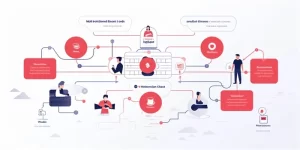With the global concerns about climate change and the need to build a sustainable future, the integration of artificial intelligence (AI) into sustainability efforts has become increasingly important. AI has the potential to revolutionize various industries and help create eco-friendly solutions that can mitigate environmental challenges. In this article, we will explore how AI is paving the way for a better and more sustainable future from multiple perspectives.

1. Energy Efficiency:
AI can optimize energy consumption in buildings by analyzing data from various sensors, weather patterns, and user behavior. Machine learning algorithms can help automatically adjust temperature, lighting, and other resources to minimize energy waste, resulting in significant cost savings and reduced environmental impact.
Additionally, AI-powered smart grids can proactively manage energy distribution, balance demand and supply, and integrate renewable energy sources effectively. This enhances the reliability and efficiency of the overall power grid system.
2. Sustainable Agriculture:
AI can assist farmers in reducing the environmental impact of agricultural practices. Machine learning algorithms can analyze soil conditions, crop health, and weather patterns to optimize irrigation, reduce pesticide usage, and improve overall crop yield. This ensures sustainable farming practices by minimizing resource waste and environmental pollution.
Furthermore, AI-powered drones and robots can automate tasks such as monitoring crop health, identifying diseases, and applying targeted treatments. This not only increases productivity but also reduces the need for harmful chemical interventions.
3. Waste Management:
AI can revolutionize waste management processes by enabling more efficient sorting, recycling, and disposal techniques. Computer vision technology combined with machine learning algorithms can identify and categorize different types of waste, making recycling and sorting processes more effective.
In addition, AI-powered robots can automate waste sorting in recycling plants, freeing up human resources for more strategic tasks. This accelerates the recycling process, reduces landfill usage, and minimizes the environmental impact of waste disposal.
4. Intelligent Transportation:
AI can play a crucial role in transforming transportation systems into eco-friendly alternatives. Machine learning algorithms can optimize traffic flow, reducing congestion and carbon emissions. Integrated with autonomous driving technology, AI can enable efficient route planning, reducing fuel consumption and greenhouse gas emissions.
Furthermore, AI-powered predictive maintenance systems can monitor and optimize the performance of vehicles, reducing the environmental impact of unnecessary repairs and improving fuel efficiency.
5. Environmental Monitoring:
AI can enhance environmental monitoring by processing large volumes of data collected from satellites, sensors, and drones. Machine learning algorithms can detect patterns, identify anomalies, and predict natural disasters such as wildfires, floods, and earthquakes.
Moreover, AI can analyze air and water quality data in real-time, enabling authorities to take proactive measures to mitigate pollution and protect ecosystems. This promotes a sustainable approach to natural resource management.
6. Sustainable Supply Chain:
AI can optimize supply chain processes by identifying areas of inefficiency and reducing waste throughout the entire lifecycle of products. Machine learning algorithms can analyze data from various sources, including suppliers, materials, production, and logistics to improve resource allocation and minimize environmental impact.
Furthermore, AI-powered blockchain technology can enhance transparency and traceability in supply chains, allowing consumers to make informed decisions based on the sustainability credentials of products.
7. Water Conservation:
AI can assist in water conservation efforts by monitoring and managing water usage in households, industries, and agriculture. Machine learning algorithms can analyze data from connected devices and sensors to identify and address abnormalities, leaks, and excessive water consumption, thereby promoting efficient water usage.
Additionally, AI can predict water availability and demand, helping authorities develop effective drought management strategies and optimize water allocation.
8. Disaster Response:
AI can significantly improve disaster response efforts by enabling faster and more accurate assessments of affected areas. Machine learning algorithms can analyze satellite imagery and social media data to identify affected areas, assess damage, and prioritize resources for rescue and recovery.
Furthermore, AI-powered chatbots can provide information and support to affected individuals during times of crisis, ensuring efficient communication and assistance.
FAQs:
Q: Can AI help reduce carbon emissions in industries?
A: Yes, AI can optimize industrial processes by identifying energy wastage, suggesting energy-efficient alternatives, and improving overall productivity. By reducing energy consumption, carbon emissions can be significantly lowered.
Q: Can AI be used to combat deforestation?
A: Absolutely! AI can analyze satellite data to identify illegal logging activities and track deforestation patterns. This information can then be used to develop targeted conservation strategies and enforce stricter regulations.
Q: Is AI fully reliable for environmental predictions?
A: While AI algorithms can provide valuable insights and predictions, they should be used in conjunction with human expertise and traditional monitoring methods. Combining AI technology with human intelligence ensures better decision-making in complex environmental scenarios.
References:
1. Müller, S., Behnke, G., & Rahimi, M. (2020). Artificial Intelligence in Environmental Sciences: Key challenges and future prospects. Science of The Total Environment, 712, 136462.
2. Ortiz, J., Rodríguez-Guerra, C., & Arriaga-Jordan, C. (2021). Artificial Intelligence and Sustainability: An Overview. Sustainability, 13(7), 3905.
3. Lu, Y., Wen, J., & Yuan, X. (2021). Machine Learning and Artificial Intelligence for Sustainable and Smart Agriculture: Features, Challenges, and Perspectives. Information Processing in Agriculture, 9(2), 336-345.








